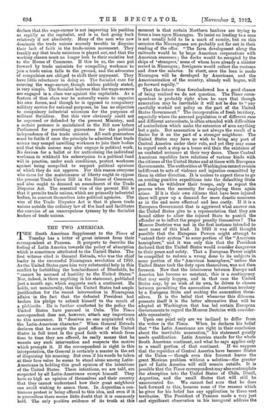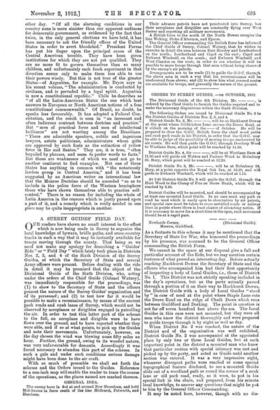1.11.0 TWO AMERICAS. T HE South American Supplement to the Times
of Tuesday has a letter of great interest from their correspondent at Panama. It purports to describe the feeling of Latin America towards the policy of absorption which is sometimes attributed to the United States. The first witness cited is General Estrada, who was the chief leader in the successful Nicaraguan revolution of 1910. As the United States gave him very substantial help in this conflict by forbidding the bombardment of Bluefields, he " cannot be accused of hostility to the United States." Nor, indeed, is there anything in his statement, published just a month ago, which suggests such a sentiment. He holds, not unnaturally, that the United States had ample justification for the recent intervention in Nicaraguan affairs in the fact that the defeated. President had broken his pledge to submit himself to the result of a plebiscite. He is further comforted by the policy the United States have pursued in Cuba. The Times correspondent does not, however, attach any importance to this assurance. It " deceives no one acquainted with the Latin-American character." When General Estrada declares that he accepts the good offices of the United States in full trust in the good faith with which from time to time they are offered, he really means that he resents any such intervention and suspects the motive which prompts it. If the correspondent is right in this interpretation, the General is certainly a master in the art of disguising his meaning. But even if his words be taken at their face value he seems to stand alone among Latin- Americans in holding this good opinion of the intentions of the United States. These intentions, we are told, are suspected by all Latin-Americans except himself. They have so high an opinion of themselves and their country that they cannot understand how their great neighbour can avoid wishing to annex them. In Argentina a con- tinuous protest is being offered to this idea, and even if it is groundless there seems little doubt that it is commonly held. The only positive evidence of its truth at this moment is that certain Northern bankers are trying to force a loan upon Nicaragua. To insist on lending to a man is not usually held to be a mark of enmity, but on this occasion the Nicaraguans are probably not far out in their reading of the offer. " The farm development along the railroads would be by large American corporations with American overseers ; the docks would be occupied by the ships of 'strangers,' some of whom have already a sinister record in Nicaragua; foreigners would collect the customs and draw the salaries. In short, once the loan is made Nicaragua will be developed by Americans, and the Americanization of the country, already well begun, will go forward rapidly."
That the future thus foreshadowed has a good chance of being realized we do not question. The Times corre- spondent is probably right when he says that though annexation may be inevitable it will not be due to " any carefully worked. out policy on the part of the United States Government." The incorporation of fresh territory, especially where the annexed population is of different race and different antecedents, is often attended with difficulties of assimilation which make the extension of area anything but a gain. But annexation is not always the result of a desire for it on the part of a stronger neighbour. The United States may have no wish to bring any part of Central America under their rule, and yet they may come to regard such a step as a lesser evil than the existence of an unabated nuisance at their very doors. These Central American republics have relations of various kinds with the citizens of the United States and at times with European Governments. The authorities at Washington cannot remain indifferent to acts of violence and injustice committed by them in either direction. It is useless to expect them to go on sending punitive expeditions into the defaulting State and then to withdraw their troops, only to repeat the process when the necessity for employing them again arises. If it is their own citizens that have been injured there will grow up a demand for more drastic measures as in the end more effectual and less costly. If it is a European Government that is aggrieved what answer can the United States give to a representation that they are bound either to allow the injured State to punish the offender or to inflict the proper penalty themselves ? The Monroe Doctrine was not in the first instance intended to meet cases of this kind. In 1823 it was still thought possible that the European Powers might attempt to "extend their system" to some portion of the "American hemisphere," and it was only this that the President declared that the United States would consider dangerous to their peace and safety. That a European Power might be compelled to redress a wrong done to its subjects in some portion of the "American hemisphere," unless the United States took the duty upon themselves, was not then foreseen. Now that the intercourse between Europe and America has become so constant, this is a contingency that may easily happen, and in that case the United States may, by no wish of its own, be driven to choose between permitting the annexation of American territory by a European State and making the annexation them- selves. It is the belief that whenever this dilemma, presents itself it is the latter alternative that will be adopted at Washington that has led certain European Governments to regard the Monroe Doctrine with consider- able equanimity. Upon one point only are we inclined to differ from the writer in the Times. When he declares his belief that " the Latin Americans are right in their conclusion about the inevitable annexation," his statement greatly needs qualification. Latin America stands for the -whole South American continent, and what he says applies only to a small portion of that continent. If we suppose that the republics of Central America have become States of the Union — though even this forecast leaves the great Mexican problem without a solution—the greater part of Latin America will still remain outside. It is possible that the Times correspondent may also contemplate the absorption into the United States of Chile, Brazil, Argentina, and the small States that will still be unaccounted for. We cannot feel sure that ho does look forward to this, because none of the reasons which be gives for his belief has any application to these vast territories. The President of Panama made a very just and significant observation in his inaugural address the other day. " Of all the alarming conditions in our country none is more sinister than our apparent unfitness for democratic government, as evidenced by the fact that twice, in the only general elections we have held, it has been necessary to ask the friendly offices of the United States in order to avert bloodshed." President Porras has put his finger upon the principal cause of the Central American trouble. They have been given institutions for which they are not yet qualified. They are no more fit to govern themselves than so many children, and unfortunately each fresh experiment in that direction seems only to make them less able to use their powers wisely. But this is not true of the greater States—of Argentina, for example. Mr. Bryce says in his recent volume, " The administration is conducted by civilians, and is pervaded by a legal spirit. Argentina is now a constitutional republic." Chile he describes as " of all the Latin-American States the one which best answers to European or North American notions of a free constitutional commonwealth." Of Brazil, no doubt, he speaks less favourably. It has adopted a Federal Con- stitution, and the result is seen in " an incessant and often ludicrous contrast between doctrine and practice." But " men of practical force and men of intellectual brilliance" are not wanting among the Brazilians. " There are admirable speakers, subtle and ingenious lawyers, astute politicians, administrators whose gifts are approved by such feats as the extinction of yellow fever in Rio and Santos." They are, it is true, " often beguiled by phrases, and seem to prefer words to facts." But those are weaknesses of which we need not go to another continent to find examples. Not one of these States has anything in common with " the notoriously lawless group in Central America," and it has been suggested by an American writer on international law that the Monroe Doctrine should be amended " so as to include in the police force of the Western hemisphere those who have shown themselves able to practise self- control." There is no reason for including the whole of Latin America in the censure which is justly passed upon a part of it, and a remedy which is really needed in one place may be quite inappropriate in another.



























































 Previous page
Previous page